Miss Universe GB: First black winner Dee-Ann Kentish-Rogers on 'great achievement'
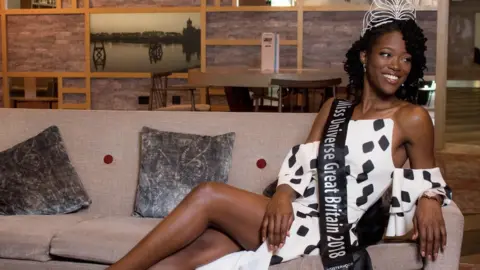 Kev Wise
Kev WiseThe first black woman to be crowned Miss Universe Great Britain in the pageant's 66-year history has called it "a great achievement".
Dee-Ann Kentish Rogers, who's also a competitive athlete and recently passed her exams to be a barrister, says the massive response to the fact she's a black woman has "kind of startled" her.
"Although I've been preparing for this pageant for a long time, I've just been preparing as Dee-Ann," she tells Newsbeat.
"Now that I've won the pageant, I've come to the realisation that I've not only won the pageant as Dee-Ann, but as a black woman."
Miss Universe GB selects Britain's representative for the Miss Universe contest.
The 25-year-old from Anguilla, a British overseas territory, currently lives in Birmingham and will represent Great Britain in the 67th Miss Universe pageant later this year.

Miss Universe in the United Kingdom: A brief history
The Miss Universe Great Britain franchise started in 1952, but has undergone several name changes, which often causes confusion.
And in some years the UK hasn't had a representative at Miss Universe.
There was no Miss Universe Great Britain after its first year for almost four decades afterwards. England, Scotland and Wales would hold their own separate competitions instead.
A combined pageant returned in 1991 and Anita St Rose (of Trinidadian descent) won Miss Universe Great Britain in 1996.
The pageant's name was changed to Miss Universe United Kingdom in 2000.
The name was changed back to Miss Universe GB in 2008, a name it still has today.
In terms of the competition as it's currently known, Dee-Ann Kentish-Rogers is the first black woman to win the title.

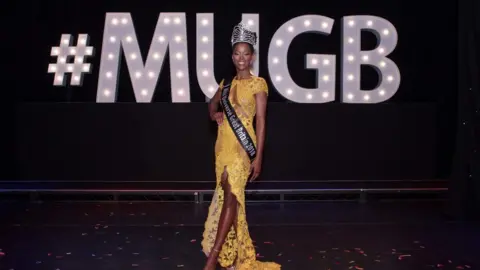 Kev Wise
Kev WiseAs a dark-skinned black woman with dreadlocks, Dee-Ann recognises just how significant it is for her to be given the title.
People outside of the pageant have asked if she'd consider taking her hair down or straightening it for the competition because of the negative connotations associated with dreadlocks, but she adamantly refused.
"I felt that it was very important for me to represent my cultural identity and to represent myself truly on this platform.
"This is a part of who I am. If you're going to take one part of me, you're going to take all of me."
Dee-Ann says she's received several humbling messages since winning the pageant, including some from mothers on behalf of their daughters.
"Some individuals have reached out to me in a personal capacity just to say that my win feels like a win for them.
"As it got closer to the competition, I started to feel the magnitude of what this could mean if I were to get the crown, not just for black women, but for Great Britain as a whole."
'The hardest muscle to master'
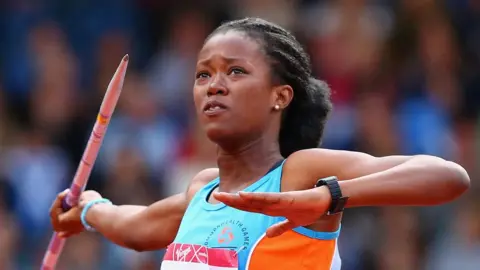 Getty Images
Getty ImagesBecoming Miss Universe Great Britain wasn't always Dee-Ann's dream.
She originally wanted to be an Olympic heptathlete for Great Britain, having competed twice in the Commonwealth Games, but a knee injury meant she could no longer pursue that goal.
"My dream kind of reinvented itself and it shifted into pageantry because in pageantry you have the same reach.
"Miss Universe Great Britain was the pageant equivalent of becoming an Olympic athlete for Great Britain."
But Dee-Ann says being in a pageant was harder than preparing for her sporting competitions.
"They're very similar, but being in a pageant you have to undergo a kind of surgical examination of yourself, your ambitions, things that people don't do until they're very, very old.
"Most of the preparation for the Commonwealth Games is done on the track... but in pageantry, the mind is the focal point, and the mind is I think the hardest muscle to master."
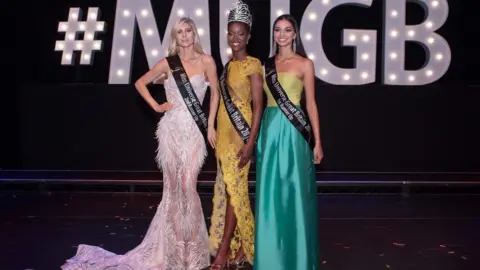 Kev Wise
Kev WiseWhile some may argue that pageantry is an out-of-date institution, Dee-Ann says that its potential to give women a voice is exactly why it's just as valuable today.
"Pageantry has been getting a lot of backlash because of people thinking it's very archaic, but pageantry for me has given me a platform, given me a voice, given me the opportunity to empower myself.
"One of the biggest problems that women have in the 21st century is having people listen to them.
"We have had to be very creative in making a space for ourselves."
But can a competition that focuses so much on a woman's appearance really be a good influence for young girls?
Dee-Ann says yes, although she admits that questions about pageantry and beauty standards are "understandable".
"As someone who's gone through the system, I would advocate for it for young women.
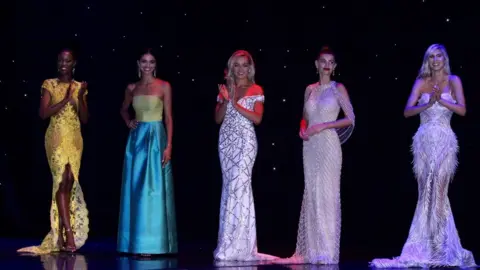 Kev Wise
Kev Wise"Most of the women who I've known or have come into contact with through pageantry have grown exponentially since the pageant. They've pursued their goals relentlessly and have achieved what they've set out to do."
In terms of her own goals, Dee-Ann passed her exams to be a barrister earlier this month and will officially qualify in London at the end of July.
For the future of beauty pageantry and its diversity, Dee-Ann hopes to show other young women that their dreams of competing in the pageant system are absolutely possible.
"The buzz that's surrounding my victory in Miss Universe Great Britain is the first indication as to why it's so important today," she told Newsbeat.
"If I can say that to a young black girl, an Asian girl, any girl of any ethnicity in the United Kingdom, especially in this post-Brexit, post-Windrush era, then I would be ecstatic because I would have done my job."
